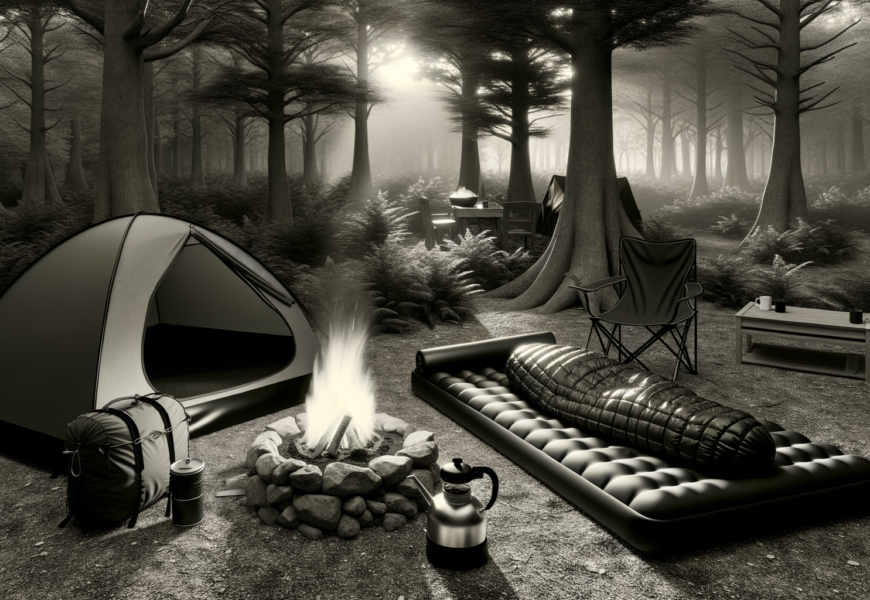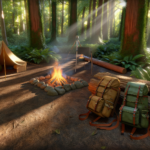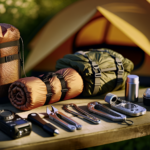Essential Camping Gear Checklist
Camping offers a unique opportunity to connect with nature, escape the hustle and bustle of daily life, and create unforgettable memories. However, having the right camping gear can make or break your outdoor adventure. In this guide, we'll delve into the must-have camping equipment, covering everything from tents and sleeping bags to cooking tools and survival kits. Whether you're a seasoned backpacker or a first-time camper, our expert tips and recommendations will help you prepare for any challenge the wilderness might throw at you.
1. Essential Camping Gear Checklist
Tents: Different Types and Considerations
The right tent serves as your sanctuary in the wild, so choosing one that meets your needs is crucial. Here are the main types:
- Dome Tents: Ideal for general camping, easy to set up, and stable in windy conditions.
- Tunnel Tents: Provide ample space and are great for larger groups.
- Pop-Up Tents: Perfect for quick setups, usually suited for fair weather.
When selecting a tent, consider factors such as size, weight, weather resistance, and ease of setup. Look for materials that offer a good balance of durability and breathability.
Sleeping Bags: Comfort and Warmth
A quality sleeping bag is essential for a good night's sleep in the wilderness. Pay attention to:
- Materials: Synthetic for wet conditions, down for lightweight and warmer options.
- Temperature Ratings: Choose based on the lowest temperatures you expect to encounter.
- Sizes: Ensure the sleeping bag fits comfortably around your body size and shape.
Investing in a high-performance sleeping bag tailored to the season and weather conditions will dramatically improve your camping experience.
Backpacks: Finding the Perfect Fit
Your backpack is your companion on the trail, so choosing one that fits well and meets your needs is paramount. Consider these aspects:
- Size: Daypacks (20-30 liters) for short hikes, bigger packs (50 liters and above) for multi-day trips.
- Fit: Adjustable straps, padded hip belts, and an ergonomic design for comfort during long hikes.
- Features: Hydration compatibility, multiple compartments, and external attachment points for gear.
Try on several backpacks loaded with weight to ensure they fit comfortably and distribute weight evenly.
Sleeping Pads and Mattresses: Comfort Matters
A good sleeping pad or mattress adds an extra layer of comfort and insulation from the cold ground. Options include:
- Foam Pads: Lightweight and durable, though bulkier to pack.
- Inflatable Pads: Offer excellent comfort and compact packing size.
- Self-Inflating Pads: Blend of foam and inflatable pads, providing a balance between comfort and portability.
Choose based on your preferred balance between comfort, weight, and packability.
2. Camp Cooking Equipment
Stoves and Fuel: Cooking Made Easy
Having a reliable camping stove can make cooking in the wild a breeze. Types include:
- Canister Stoves: Convenient and easy to use, best for shorter trips.
- Liquid Fuel Stoves: More versatile and perform well in cold conditions.
- Wood-Burning Stoves: Eco-friendly, using natural fuel found around the campsite.
Consider the type of fuel availability, burn time, and cooking efficiency when selecting your stove.
Cookware: Essential for Outdoor Cooking
Invest in lightweight, durable cookware tailored for camping. Essentials include:
- Pots and Pans: Non-stick and nested sets are ideal for compact packing.
- Utensils: Sturdy and multi-functional utensils like sporks, spatulas, and tongs.
- Portable Grills: For those who enjoy campfire cooking.
Opt for materials like titanium or aluminum for a good balance of durability and weight.
Food Storage: Keep It Fresh and Safe
Proper food storage is crucial to prevent attracting wildlife and spoilage. Key solutions include:
- Bear-Proof Containers: Essential in bear country.
- Coolers: For perishable items, consider ice retention and durability.
- Dry Bags: For storing dry goods and preventing moisture.
Effective food storage ensures your food stays fresh and secure throughout your trip.
Water Purification: Clean Drinking Water
Access to clean drinking water is vital. Here are reliable methods:
- Water Filters: Portable and effective for removing bacteria and protozoa.
- Water Purification Tablets: Lightweight and easy to use, though they often leave an aftertaste.
- UV Purifiers: Use ultraviolet light to kill pathogens, compact but require batteries.
Always have a backup method to ensure continuous access to safe drinking water.
3. Clothing and Footwear for Camping
Layering: Stay Warm and Comfortable
Layering your clothing is essential for adapting to varying weather conditions. The three-layer system includes:
- Base Layer: Wicks moisture away, keeping you dry.
- Insulating Layer: Provides warmth; think fleeces or down jackets.
- Outer Layer: Shields against wind and rain; waterproof and breathable materials are best.
Having appropriate layers ensures you remain comfortable and prepared for temperature changes.
Footwear: Best Choices for the Trail
Your feet will thank you for investing in quality footwear. Consider the following:
- Hiking Boots: Offer ankle support and durability for rough terrains.
- Trail Shoes: Lightweight and versatile, suitable for well-maintained trails.
- Sandals: Useful for river crossings and around the campsite.
Ensure your footwear is well broken-in to avoid blisters and discomfort.
Weather-Appropriate Gear: Prepare for the Elements
Weather can be unpredictable, so pack accordingly:
- Rain Jackets: Lightweight, waterproof, and breathable.
- Thermal Wear: Keeps you warm during chilly nights.
- Sun Protection: Hats, sunglasses, and sunscreen for hot and sunny conditions.
Preparation for various weather conditions ensures you stay comfortable no matter what the forecast holds.
Accessories: Small Items, Big Impact
Don't overlook the importance of these accessories:
- Hats and Gloves: Protect from the sun and keep warm in cold conditions.
- Gaiters: Shield your lower legs and feet from mud and debris.
- Buffs and Neck Gaiters: Versatile protection for your neck and face.
These small items can significantly enhance your overall comfort and protection.
4. Safety and Survival Gear
First Aid Kits: Be Prepared
A well-stocked first aid kit is a must for any camping trip. Essential items include:
- Bandages and Gauze: For cuts and wounds.
- Antiseptic Wipes: Clean and prevent infection.
- Pain Relievers: For headaches or minor aches.
- Tweezers and Scissors: Versatile tools for first aid.
Being prepared for medical emergencies ensures minor injuries don’t turn into major issues.
Navigation Tools: Find Your Way
Avoid getting lost with the right navigation tools:
- Maps and Compasses: Reliable and don’t require batteries.
- GPS Devices: Offer precise location tracking and route planning.
- Altimeters: Useful in mountainous regions to measure altitude.
Understanding how to use these tools is crucial for any serious camper.
Emergency Shelters: Lightweight Protection
Emergencies can arise unexpectedly, so having a lightweight shelter is key:
- Emergency Blankets: Compact and help retain body heat.
- Bivvy Sacks: Provide additional warmth and protection.
- Tarp Shelters: Versatile and can be set up quickly.
These items should be easily accessible in your pack.
Multi-tools and Knives: Versatile Solutions
A good multi-tool and knife can be a lifesaver:
- Multi-tools: Include pliers, screwdrivers, and cutting tools.
- Knives: Essential for food prep, gear repairs, or protection.
- Fire Starters: Matches, lighters, and ferro rods.
Their versatility makes them indispensable additions to your camping gear.
5. Camping Comforts and Extras
Camp Furniture: Adding a Touch of Home
For additional comfort, consider packing camp furniture:
- Chairs: Lightweight and foldable for easy transport.
- Tables: Compact but useful for meal prep and dining.
- Hammocks: Perfect for relaxing and enjoying the outdoors.
Bringing these items along provides a home-away-from-home feeling.
Lighting: Illuminate Your Camp
Good lighting is essential for safety and functionality:
- Lanterns: Provide area lighting and are great for group settings.
- Headlamps: Hands-free lighting for tasks and hiking at night.
- Flashlights: Handy for quick illumination needs.
Ensure you have spare batteries or consider solar-powered options.
Entertainment: Beyond the Basics
Keep boredom at bay with some simple entertainment options:
- Books and Magazines: Perfect for relaxation.
- Compact Games: Cards, travel-sized board games, and more.
- Musical Instruments: If you're musically inclined, a harmonica or ukulele can liven up the campfire.
Balancing adventure and downtime enhances the camping experience.
Insect Repellents: Keep the Bugs Away
Protect yourself from annoying insects with effective repellents:
- DEET-Based Repellents: Highly effective but can be harsh on the skin.
- Natural Options: Like citronella and eucalyptus oil for a gentler alternative.
- Bug Nets: For sleeping areas to provide added protection.
Maintaining a bug-free camp ensures a more enjoyable and itch-free experience.
Conclusion
Camping can be one of the most enriching ways to spend your time, but preparation is key. From selecting the perfect tent to packing essential cooking equipment and survival gear, every detail matters. Use our guide as a checklist to make sure you're well-prepared for your next outdoor adventure. Ready to get started? Explore our recommended camping gear to make your next trip a memorable one. Happy camping!
By following this comprehensive guide, you can ensure a comfortable and hassle-free camping experience, leaving you to enjoy the beauty of the great outdoors. Remember, good preparation leads to great adventures, so check off each item and let nature do the rest.



